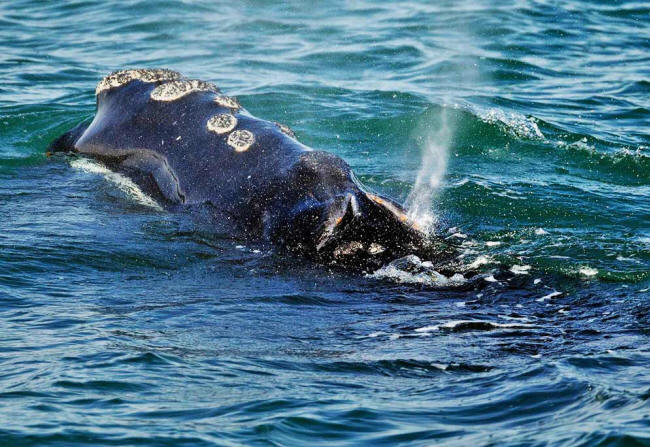|

by
James Freeman
December
19, 2022
from
WindTaskForce Website

A North Atlantic
right whale.
Photo: Michael
Dwyer/Associated Press
This column has been
making the case that replacing efficient forms of reliable energy
with politically favored intermittent power sources is not as easy
as it looks.
Some jurisdictions seeking to replace
fossil fuels and/or
nuclear
plants with
wind power may not have adequately considered the costs
and benefits.
Perhaps no political class outside of California has been as hostile
to cost/benefit analysis as the elected officials of Massachusetts.
Now Jon Chesto reports for
the Boston Globe:
"The state's
nascent offshore wind industry suffered a big setback on Friday
when Avangrid told
state regulators it wants to end its contracts with
three major utilities to build
a massive wind farm south of Martha's Vineyard...
In September,
chief executive Pedro Azagra said Avangrid would
postpone construction of
Commonwealth Wind, which could eventually provide
enough power for up to 750,000 homes, by
pushing its completion date out
to 2028, and would
need to rewrite the contracts because of a sharp increase in
commodity costs.
With Friday's
move, Avangrid has given up on those renegotiation efforts.”
Some readers may
feel like they've been hearing
about how close wind power is to commercial viability for
virtually their entire lives.
Regardless,
this seems to be another reminder
that the 'desires' of
politicians
cannot change the
underlying physics and economics.
The Boston Globe
report continues:
"This move just
adds to the pressure on policymakers.
Offshore wind
power is considered crucial for Massachusetts to meet its
ambitious goal of cutting
greenhouse gas emissions in half by 2030 from 1990 levels.
Representatives
for the Baker administration and Governor-elect Maura
Healey expressed disappointment with Avangrid's decision.”
This broad spectrum
of disappointment brings us to another lesson:
the fact that
an idea is
bipartisan does not mean it will
work...
Another lesson that
must constantly be taught to policymakers is that,
every method of producing energy
brings with it some kind of
environmental footprint, some costs along with the
alleged benefits.
There is no free
lunch...
Even before the
team behind
Commonwealth Wind acknowledged their problem with
economics,
some of the locals were focusing on
the footprint.
Heather McCarron
reported last month for the Cape Cod Times:
"To the
residents of Osterville, Dowses Beach is perfect:
A place of
refuge for people, a sanctuary to a variety of wildlife, and
a delicate landscape that needs to be handled with extra
special care.
The beach, with
its sweeping view of Nantucket Sound, is also perfect for
offshore wind developer
Avangrid Renewables...
"Avangrid is
eyeing the beach to land three
power cables - that will transmit a total of 1,200
kilowatts of electricity - from
its Commonwealth Wind project, one of several
commercial-scale, offshore wind projects with a lease to harness
the winds south of Martha's Vineyard...
"Meanwhile, a
number of the residents are
circling their wagons,
worried about the impacts the project could have on Dowses
Beach - an estuarine environment they think is too fragile to
carry such a large project...
The group
pointed out that the Dowses Beach estuarine system
shelters at least
two species of vulnerable birds - plovers and the least
tern."
As for economics,
Commonwealth is not the only wind project under scrutiny.
Alex Kuffner reported last
month for the Providence Journal:
"Rhode Island
utility regulators are considering suspending Mayflower Wind's
application for transmission cables that would run up the Sakonnet River to the former site of the Brayton Point Power
Station in Somerset after the developer raised questions about
the financial viability of the first phases of the $5 billion
offshore wind project it has proposed off Massachusetts.
"The state
Energy Facility Sitting Board has ordered the company to
demonstrate why the proceedings shouldn't be stayed until the
questions surrounding the financing of the first 1,200 megawatts
of the project are resolved.”
It's beginning to
seem like replacing cheap and
reliable energy production is
complicated and costly.
But
politicians have made promises
and of course
not just in Massachusetts and Rhode
Island. The
Garden State's liberal electorate
has been choosing politicians
promoting allegedly green policies for years.
Therefore purveyors
of alternative energy might have expected nothing but warm greetings
from Asbury Park, N.J.
Yet down the shore many
residents aren't eager to have massive metal virtue signals rising
out of the water, even if they are 15 miles offshore.
Amanda Oglesby
recently reported for the Asbury
Park Press on local opposition, including among residents of
Long Beach Island:
...Save LBI, a group
that opposes offshore wind farms close to shore, said wind
turbines off New Jersey would harm endangered North Atlantic
right whales.
Ocean surveying,
installation of wind turbines and the noise created by the
operations would create unacceptable levels of noise for the
whales, according to a Save LBI news release issued Monday.
The population of North Atlantic right whales has declined to
fewer than 350 members, according to the National Oceanic and
Atmospheric Administration (NOAA).
The whales are
vulnerable to ocean noise pollution, vessel strikes, shifts in
prey locations, and habitat degradation, according to NOAA.
|


